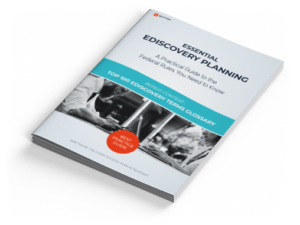The adversarial nature of the system of law in the United States is not about cooperation and playing nice. Law schools train lawyers to crush their opposition.
But in ediscovery, the updated Federal Rules of Civil Procedure and emerging case law not only make it possible for discovery to be a cooperative process, but if you know how to make the rules work for you, they can level the playing field for all firms, regardless of size. You just need proactive ediscovery planning at the outset.
Discovery rules and pretrial procedures are designed to remove the risk of surprises at trial and provide a more fair contest “by requiring disclosure of all relevant information.”
However, the discovery of all possible relevant information in our electronic world is not always possible. If parties try to collect and review all available information, the party with more money to spend will likely control the process.
Negotiate With Opposing Counsel
To start, every attorney should familiarize themselves with the Sedona Conference’s Cooperation Proclamation. The document promotes a less adversarial approach to discovery that’s not only practical, but has also been endorsed by judges across the country.
Begin any discovery process by convening with opposing counsel at the Meet and Confer and work towards a consensus about the scope of preservation for both sides. You should show up to this conference with detailed ESI protocols to ensure no issues are overlooked. To avoid conflict and confusion, these negotiations should be carefully documented.
The development of search and retrieval methods and the disclosure of data sources should be topics of particular interest. Ignoring these issues may mean you miss the best chance to find data within a reasonable timeframe and cost.
Familiarize Yourself with the Federal Rules of Civil Procedure in Ediscovery
Rule 26(f):
Setting the Ground Rules
The actual negotiation will begin with what is known as a 26(f) Conference, which happens before any discovery can occur. The courts have made it clear these conferences should happen as early as possible and parties should agree on foundational principles like the forms of production.
If parties can’t agree within two weeks, they face the judge for what is known as the Rule 16 Conference. Once an actual discovery request is issued, the responding party may object, under Rule 26(c) and 37(a).
→ Continue reading the entire 25 page eBook:
Essential Ediscovery Planning: The Federal Rules You Need to Know
- Need-to-know Federal Rules detailed and simplified
- Clawback Agreement made simple
- Clawback checklist
- Ten step plan for ediscovery planning
- Bonus: Top 100 ediscovery terms glossary








